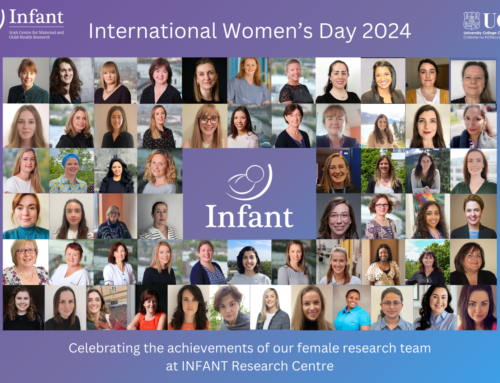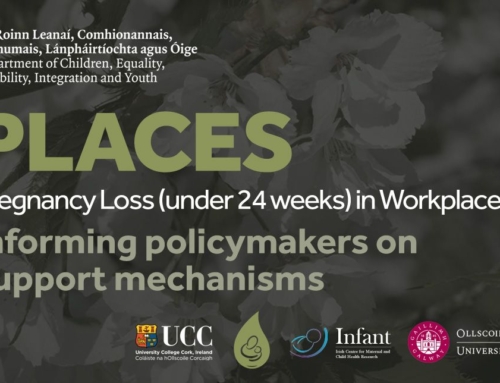Monday 10 April 2017
Partnership Announced Between INFANT & Global Partners to Explore Optimal Nutrition for Premature Infants
PiNPoINT Investigator team – L-R:
Dr Elaine McCarthy, postdoctoral researcher, Dr Brendan Murphy, Consultant Neonatologist, CUMH, Teresa Berkery, Project Manager, Stephen Lane, Software Developer, Aileen Regan, Danone Nutricia, Ana-O’Reilly Marshall, Neonatal Research Dietician, Prof Mairead Kiely, Principal Investigator, Sarah Fenton, Pharmacist, Bairbre Hickie, Fresenius Kabi, Ann-Marie Brennan, Clinical Specialist Neonatal Dietitian, Christian Stafford, Business Development Manager, INFANT, Brian O’Mullane, Creme Global, Conor McGauran, Creme Global, Dr Kevin Walsh, Science Foundation Ireland
(Photo: Paul Sherwood Photography)
On April 5, the INFANT Centre, a leading Science Foundation Ireland research centre at University College Cork, today announced the launch of the Personalised Nutrition for the Preterm Infant (PiNPoINT) Study. The study aims to develop software to aid personalized nutritional management of preterm infants who have a very low birth weight. Science Foundation Ireland will invest more than €1M in the project with further support coming from three leading international partners: Creme Global, Danone Nutricia and Fresenius Kabi.
Why is PiNPoINT Needed?
1 in 16 babies is born prematurely in Ireland, before 37 weeks of pregnancy. The World Health Organisation (WHO) acknowledges that premature birth can cause a host of problems for the baby and it is the second leading cause of death for children under 5 worldwide. When born prematurely, a baby’s major organs will not have had enough time to fully develop in utero, and the infant will be born at risk of health problems, especially if they are born prior to 32 weeks.
The earlier a baby is born, the lower her birthweight may be and this too has knock-on effects for health at birth and beyond. Babies under 5.5lbs (2.5kg) are classed as Low Birth Weight babies, but the babies who will be followed in the PiNPoINT study are those who weighed less than 3lbs (1.5kg) at birth. These very low-birthweight babies are more likely to have health problems as a newborn and will need special care in the hospital’s neonatal intensive care unit (NICU).
What Will PiNPoINT Do?
PiNPoINT will address the lack of knowledge around the nutritional requirements of these small babies to help optimize growth and development, improve functional outcomes and promote long-term health and quality of life. The PiNPoINT project will implement a novel nutritional management strategy for these infants using real-time nutritional data collection and monitoring. The plan will be based on the results of the BabyGrow longitudinal preterm nutritional study that quantified nutrition and growth in a small cohort of preterm infants.
Speaking in Dublin, Prof Mairead Kiely, Principal Investigator on the study, said the ultimate goal of this unique project is to “assist in the nutritional support of these most vulnerable members of society to promote optimal physical and neurological growth and development. We are also conducting research to better define nutritional requirements in these infants throughout the first weeks, and months, of life.”
Director of Programmes for Science Foundation Ireland, Dr Darrin Morrissey, said: “I am delighted to welcome the collaboration between INFANT and its industry partners, as part of the PiNPoINT study. The use of new software technology to enable us to better understand the nutritional needs of preterm babies has enormous potential to positively impact on their lifelong health and well-being. Science Foundation Ireland is delighted to support collaborations such as these, to bring innovation into our health care services.”
Recruitment to the study will begin later in 2017.
This study is funded by Ireland’s European Structural and Investment Funds Programme the European Regional Development Fund, and Science Foundation Ireland.



 PiNPoINT is a decision support tool to help clinicians manage the nutritional intake of preterm babies
PiNPoINT is a decision support tool to help clinicians manage the nutritional intake of preterm babies
Note: The Pinpoint study of preterm infant nutrition includes three industry partners, who are contributing a minor proportion of the funding. Preterm infants are preferentially fed on human milk, either their mother’s expressed milk, or donor milk if Mum’s milk is not available. Each sample of human milk varies from the other. It is important for us, in the Pinpoint study, to know the composition of the milk each baby is receiving. Danone, as a partner in Pinpoint, have donated a human milk analyser to the study. This analyser will provide us with the information we need to tailor each babys nutrition according to their needs, and is the first of its kind to be used in an Irish research study. Our aim is to help the neonatal care teams to provide the best possible nutritional support for vulnerable babies.






